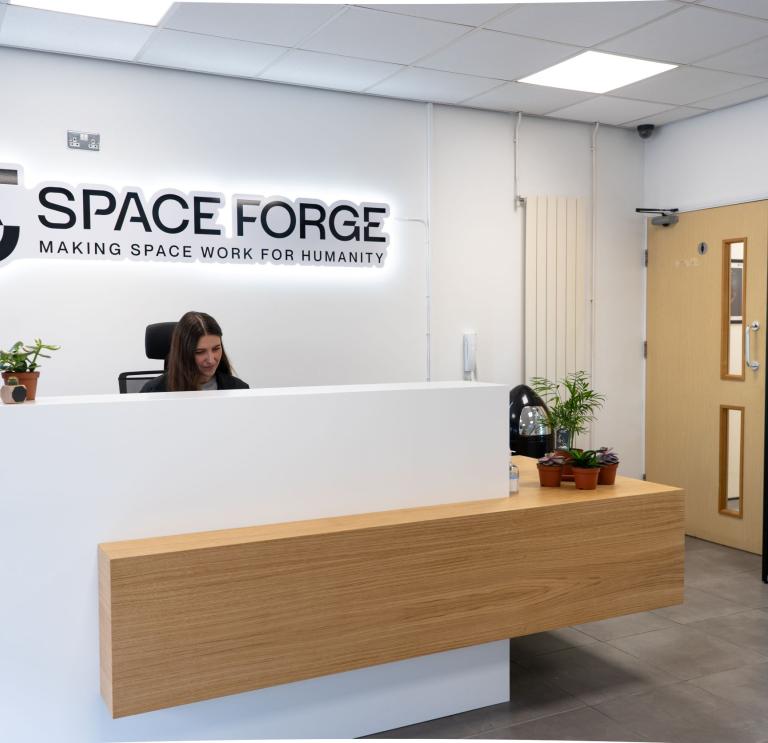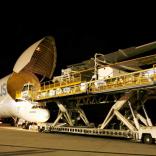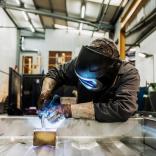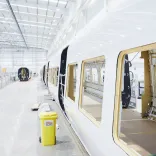Business backstory
Earth is a terrific place to live (especially Wales, in our opinion). But our home planet isn’t the ideal environment in which to make stuff – especially if you’re in the business of making highly complex, technical materials.
For a start, the Earth’s dense atmosphere contaminates even the cleanest of processes. Gravity makes it hard to create perfect alloys from metals of different densities, or to allow perfect crystals to form. And it’s very hard to create and maintain extreme hot or cold temperatures.
But in the vacuum of space, there’s no contamination. Microgravity allows for perfect crystal formation and uniform alloy mixing. Radiators facing cold space can produce temperatures close to absolute zero for superconductor and quantum devices.
This was the starting point for Space Forge’s big, brilliant idea: let’s make stuff in space.
Andrew Bacon, the company’s co-founder and CTO, says: “We’re using the space environment to make new materials that you cannot make on Earth. This may be making bigger crystals or making the strongest metals, bringing them back down to Earth, and using them to make things like more efficient aircraft turbines or better electronics for cell towers, and this will all save energy and CO2.”
Here's how it works: the Space Forge itself is a miniature ‘factory’ that’s around the size of a small oven. It’s launched into space on their ForgeStar platform, using small rockets that are carried into the upper atmosphere on jumbo jets and then fired into space (as well as being able to be launched on vertical rockets too). The ForgeStar spends anything from a couple of weeks to six months orbiting the Earth while its robotic systems are busily making new materials. Then it returns to Earth where it can be reused and redeployed on new missions.
The first generation of platform, the ForgeStar-1 will be ready to launch by the end of 2024, with the second generation, the larger ForgeStar-2, coming online in 2025, rising to weekly launches by the end of the decade.
Why Wales?
It’s certainly been a stellar rise for a company that was founded on a kitchen table in Bristol in 2018 by Andrew Bacon and CEO Josh Western, who met while working together at satellite manufacturer Thales Alenia Space.
Space Forge swiftly moved to Wales for a number of reasons, explains Andrew Bacon: “The first one was that there’s a lot of advanced material research going on in the Newport and Cardiff area and in the universities looking at next-generation materials, particularly in terms of electronics. So there is a really good knowledge base that we can draw from. The other aspect is the geography of Wales: we’ve got great access to coastline that we may want to be returning our satellites to in future, and access to restricted airspace, which is harder to find around the rest of the UK.
“And thirdly, investment. One of our first backers was the Development Bank of Wales and they really understood the vision of what we were trying to create. We’ve certainly not had any trouble in recruiting people to come and live and work here. Cardiff is a really exciting and vibrant place to live and work.”
How has the Welsh Government helped?
Space Forge has now grown its team to 60 in Wales (spanning 22 nationalities), and have now established a US office too. With Welsh Government help, they’re looking for a new, bigger factory. In 2021 they secured a £7.7m equity boost in what is Europe’s largest ever seed funding round for a space tech company. They had already been awarded a £1.7m contract through the European Space Agency’s Boost! Programme, supported by the UK Space Agency.
Space Forge also continues to benefit from local support, says Andrew Bacon: “Welsh Government have always been there to help us with our unique needs as a business and our unusual testing requirements. We’re really excited to be working with Wales and the Welsh Government to be able to set up operational sites and landing sites so we can make Wales the best place on Earth to return a satellite.”
According to Economy Minister Vaughan Gething: “Wales has a track record of delivering high-value manufacturing and innovation which puts a vibrant cluster of space industry leaders operating here in a prime position to flourish in this growing sector. Space Forge is a shining example of the sort of innovative, agile and sustainable company we are committed to supporting.”




